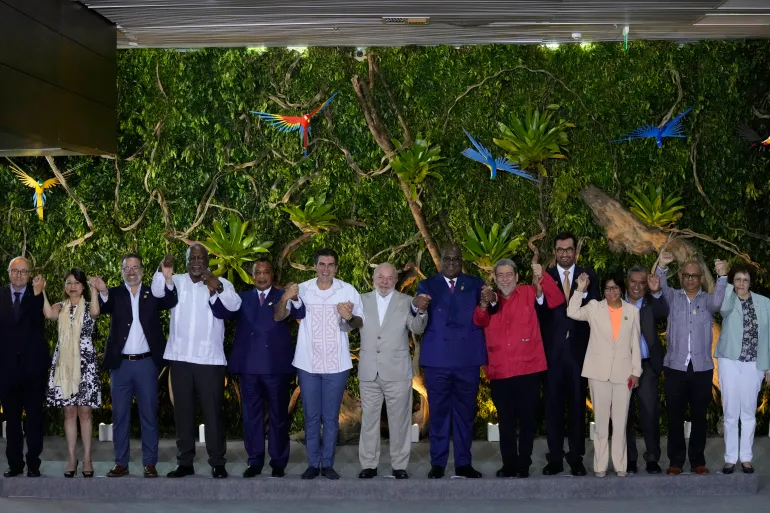Leaders from the Amazon nations, as well as representatives from the Republic of Congo, the Democratic Republic of Congo, Indonesia, and France, convened in the Brazilian city of Belem for a two-day summit to discuss the preservation of ecologically diverse regions and their role in countering the climate crisis. The summit marks the fourth meeting of the Amazon Cooperation Treaty Organization (ACTO) countries in its 45-year existence.
The eight member nations of ACTO – Bolivia, Brazil, Colombia, Ecuador, Guyana, Peru, Suriname, and Venezuela – expressed the hope that a united front would give them a significant voice in global environmental talks leading up to the COP 28 climate conference. The presidents of these nations, along with other attendees, discussed the importance of valuing the forest and emphasized that it is not merely about keeping the trees standing, but also about giving dignity to the nearly 50 million people living in the Amazon.
The summit proved to be an opportunity for bilateral cooperation discussions as well. Brazilian President Lula da Silva and DRC leader Félix Tshisekedi held a meeting to discuss areas of common interest, including the preservation of tropical forests and international policy. Following this, President Lula confirmed that he would be traveling to Kinshasa to participate in a trilateral rainforest summit with representatives from the DRC, Brazil, and Indonesia.
Another significant summit is scheduled to take place from October 26 to October 28 in Brazzaville, bringing together representatives from the largest rainforest basins in the world, namely the Amazon, Congo, and Borneo-Mekong. This gathering aims to pave the way for a groundbreaking “deal” for the preservation of the environment.
The preservation of the Amazon rainforest requires significant financial resources. The Amazon spans an area twice the size of India, with two-thirds of it located in Brazil. The remaining third is shared among seven other countries and the territory of French Guiana. As the world’s largest rainforest, it plays a crucial role in the global ecosystem. Brazilian President Lula stressed the importance of funds for forests at the upcoming UN climate conference, stating that caring for the forest canopy alone is not enough. He urged the rich world to invest in the livelihoods and well-being of the people who inhabit the forest.
The outcome of the summit in Belem was met with mixed responses. While some environmental groups expressed frustration, believing that the joint declaration lacked concrete goals and timelines, the largest Indigenous organization in the region lauded the inclusion of two of their main demands. Historically, the Amazon has been viewed as an area to be colonized and exploited, often disregarding sustainability and the rights of Indigenous peoples. However, the region’s countries have all ratified the Paris climate accord, committing to reducing greenhouse gas emissions.
Despite the shared commitment to the Paris agreement, cross-border cooperation among the Amazon nations has been historically limited due to issues such as low trust and ideological differences, as well as the lack of government presence. The joint declaration from the summit did not include a shared commitment to zero deforestation by 2030, although Brazil and Colombia have already made this commitment individually.
The Belem summit serves as a strategic move by President Lula to leverage global concern for the preservation of the Amazon. By bringing together leaders and representatives from various nations, the summit aimed to foster dialogue and collaboration in tackling the pressing climate crisis and protecting one of the world’s most vital ecosystems.
Image Credit: Eraldo Peres/AP Photo





